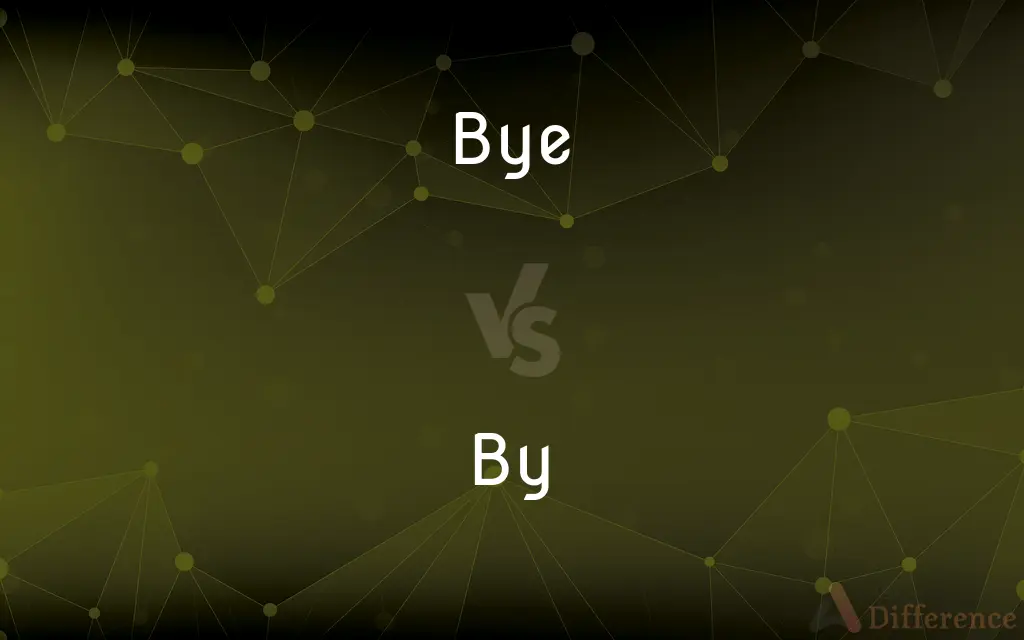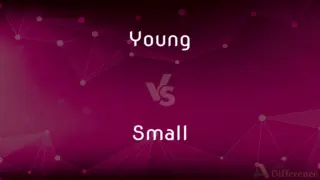Bye vs. By — What's the Difference?
Edited by Tayyaba Rehman — By Fiza Rafique — Updated on October 12, 2023
"Bye" is a farewell expression, while "by" is a preposition indicating location, means, or authorship.

Difference Between Bye and By
Table of Contents
ADVERTISEMENT
Key Differences
"Bye" and "by" represent vastly different meanings and usages in English. "Bye" is customarily used as a shortened form of "goodbye," serving as an informal expression to bid farewell to someone. Whereas "by" operates as a preposition, utilized to indicate location, means, or authorship.
The term "bye" is often used in conversational contexts and informal settings, signifying the departure of a person from a place or conversation. On the other hand, "by" works as a functional word, establishing a relationship between words within a sentence, often denoting proximity or method.
While "bye" serves to conclude interactions or dialogue, "by" performs a linking role in sentences, acting as a bridge between different elements and conveying relational meanings. Notably, "by" can reference proximity, means of doing something, or attribution, depending on context.
In various instances, "bye" might appear in both spoken and written language, acting as an amicable and colloquial term to signify one's departure. Conversely, "by" permeates multiple facets of English, offering a method to relate different words, and thereby, concepts together within sentences.
Understanding the distinction between "bye" and "by" is pivotal for clear communication, as the former is associated with departing, while the latter establishes relations and shows connections within the language structure. Hence, they function in disparate ways in language usage.
ADVERTISEMENT
Comparison Chart
Part of Speech
Interjection
Preposition
Standard Usage
Yes, as a farewell
Yes, to show relation or method
Example of Use
Bye, see you tomorrow!
The book by the author was compelling.
Emotional Connotation
Yes, often friendly
No, it's a functional word
Usage in Formal Writing
Rare
Common
Compare with Definitions
Bye
Bye is a short form of goodbye.
Bye, I'll call you later!
By
Identifying the agent performing an action.
Bye
Bye can denote the end of a conversation.
Let’s end this call with a cheerful bye.
By
By can show the method of doing something.
I traveled by train.
Bye
Bye may signal the ending of an interaction.
She left the party with a quick bye.
By
By sometimes indicates a deadline.
I need it done by Friday.
Bye
Bye can convey a friendly farewell.
With a smile, he said bye.
By
Indicating the means of achieving something
They substantiate their opinions by the use of precise textual reference
They plan to provide further working capital by means of borrowing
Malaria can be controlled by attacking the parasite
Bye
The transfer of a competitor directly to the next round of a competition in the absence of an assigned opponent
He has a bye into the second round
By
Indicating the amount or size of a margin
The raising of VAT by 2.5%
The shot missed her by miles
Bye
A run scored from a ball that passes the batsman without being hit (recorded as an extra, not credited to the individual batsman).
By
Indicating a deadline or the end of a particular time period
By now Kelly needed extensive physiotherapy
I've got to do this report by Monday
Bye
One or more holes remaining unplayed after a match has been decided.
By
Indicating location of a physical object beside a place or object
Remains were discovered by the roadside
The pram was by the dresser
Bye
Short for goodbye
Bye for now, Janie!
Okay, James. I'll call her now. Bye
By
Indicating the period in which something happens
This animal always hunts by night
Bye
A secondary matter; a side issue.
By
Concerning; according to
She had done her duty by him
Anything you do is all right by me
Bye
(Sports) The position of one who draws no opponent for a round in a tournament and so advances to the next round.
By
Used in mild oaths
It was the least he could do, by God
I swear by Almighty God
Bye
Used to express farewell.
By
So as to go past
A car flashed by on the other side of the road
He let only a moment go by
Bye
The position of a person or team in a tournament or competition who draws no opponent in a particular round so advances to the next round unopposed, or is awarded points for a win in a league table; also the phantom opponent of such a person or team.
Craig's Crew plays the bye next week.
By
Variant spelling of bye
Bye
(cricket) An extra scored when the batsmen take runs after the ball has passed the striker without hitting either the bat or the batsman.
By
Close to; next to
The window by the door.
Bye
(obsolete) A thing not directly aimed at; a secondary or subsidiary object, course, path, undertaking, issue, etc.
By
With the use or help of; through
We came by the back road.
Bye
(Scotland) An unspecified way or place.
By
Up to and beyond; past
We drove by the house.
Bye
(card games) A pass.
By
At or to
Stopped by the bakery.
Came by the house.
Bye
Obsolete spelling of bee
By
In the period of; during
Sleeping by day.
Bye
Out of the way; remote.
By
Not later than
By 5:30 PM.
Bye
Secondary; supplementary.
By
In the amount of
Letters by the thousands.
Bye
(colloquial) Goodbye.
By
To the extent of
Shorter by two inches.
Bye
Obsolete spelling of by
By
According to
Played by the rules.
Bye
A thing not directly aimed at; something which is a secondary object of regard; an object by the way, etc.; as in on or upon the bye, i. e., in passing; indirectly; by implication.
The Synod of Dort condemneth upon the bye even the discipline of the Church of England.
By
With respect to
Siblings by blood.
Bye
A run made upon a missed ball; as, to steal a bye.
By
In the name of
Swore by the Bible to tell the truth.
Bye
In various sports in which the contestants are drawn in pairs, the position or turn of one left with no opponent in consequence of an odd number being engaged; as, to draw a bye in a round of a tennis tournament.
By
Through the agency or action of
Was killed by a bullet.
Bye
The hole or holes of a stipulated course remaining unplayed at the end of a match.
By
Used to indicate a succession of specified individuals, groups, or quantities
One by one they left. They were persuaded little by little.
Bye
A dwelling.
By
Used in multiplication and division
Multiply 4 by 6 to get 24.
Bye
In certain games, a station or place of an individual player.
By
Used with measurements
A room 12 by 18 feet.
Bye
You advance to the next round in a tournament without playing an opponent;
He had a bye in the first round
By
Toward. Used to express direction with points of the compass
South by east.
Bye
A farewell remark;
They said their good-byes
By
On hand; nearby
Stand by.
Bye
Bye refers to the departure or leave-taking.
He waved and said bye.
By
Aside; away
We put it by for later.
By
Up to, alongside, and past
The car raced by.
By
At or to one's home or current location
Stop by later today.
By
Into the past
As years go by.
By
Variant of bye1.
By
Near or next to.
The mailbox is by the bus stop.
By
From one side of something to the other, passing close by; past.
The stream runs by our back door.
He ran straight by me.
By
Not later than (the given time); not later than the end of (the given time interval).
Be back by ten o'clock!.
We'll find someone by the end of March.
We will send it by the first week of July.
By
Indicates the person or thing that does or causes something: Through the action or presence of.
By
Following a passive verb.
The matter was decided by the chairman.
The boat was swamped by the water.
He was protected by his body armour.
By
Following a noun.
There was a call by the unions for a 30% pay rise.
By
(not in common modern use) Following an adjective.
I was aghast by what I saw.
By
Indicates the creator of a work: Existing through the authorship etc. of.
There are many well-known plays by William Shakespeare
By
Indicates a means of achieving something: Involving/using the means of.
I avoided the guards by moving only when they weren't looking.
By Pythagoras' theorem, we can calculate the length of the hippopotamus.
We went by bus.
I discovered it by chance.
By 'maybe' she means 'no'.
The electricity was cut off, so we had to read by candlelight.
By
Indicates an authority according to which something is done.
By the power vested in me, I now pronounce you man and wife.
By
Invokes an authority in an oath.
By Jove! I think she's got it!
By all that is holy, I'll put an end to this.
By
Indicates a means of classification or organisation.
I sorted the items by category.
Table 1 shows details of our employees broken down by sex and age.
By
Indicates the amount of change, difference or discrepancy
Our stock is up by ten percent.
His date of birth was wrong by ten years.
By
In the formulae X by X and by Xs, indicates a steady progression, one X after another.
We went through the book page by page.
We crawled forward by inches.
By
Acted on in units of the specified size or measure. (Sometimes hyperbolically)
Sold by the yard; cheaper if bought by the gross
He drinks brandy by the bucketful!
By
Per; with or in proportion to each.
His health was deteriorating by the day.
The pickers are paid by the bushel.
By
Indicates a referenced source: According to.
He cheated by his own admission.
By my reckoning, we should be nearly there.
By
Used to separate dimensions when describing the size of something.
It is easy to invert a 2-by-2 matrix.
The room was about 4 foot by 6 foot.
The bricks used to build the wall measured 10 by 20 by 30 cm.
By
(horse breeding) Designates a horse's male parent (sire); cf. out of.
She's a lovely little filly, by Big Lad, out of Damsel in Distress.
By
At, with, among
Are you eating by Rabbi Fischer? (at the house of)
By Chabad, it's different. (with, among)
By
Along a path which runs past the speaker.
I watched as it passed by.
By
In the vicinity, near.
There was a shepherd close by.
By
To or at a place, as a residence or place of business.
I'll stop by on my way home from work.
We're right near the lifeguard station. Come by before you leave.
By
Aside, away.
The women spent much time after harvest putting jams by for winter and spring.
By
Out of the way, off to one side.
A by path, a by room
By
Subsidiary, incidental.
By catch, a by issue
By
Alternative spelling of bye.
By
In the neighborhood of; near or next to; not far from; close to; along with; as, come and sit by me.
By foundation or by shady rivuletHe sought them both.
By
On; along; in traversing. Compare 5.
Long labors both by sea and land he bore.
By land, by water, they renew the charge.
By
Near to, while passing; hence, from one to the other side of; past; as, to go by a church.
By
Used in specifying adjacent dimensions; as, a cabin twenty feet by forty.
By
Against.
By
With, as means, way, process, etc.; through means of; with aid of; through; through the act or agency of; as, a city is destroyed by fire; profit is made by commerce; to take by force.
By
Near; in the neighborhood; present; as, there was no person by at the time.
By
Passing near; going past; past; beyond; as, the procession has gone by; a bird flew by.
By
Aside; as, to lay by; to put by.
By
Out of the common path; aside; - used in composition, giving the meaning of something aside, secondary, or incidental, or collateral matter, a thing private or avoiding notice; as, by-line, by-place, by-play, by-street. It was formerly more freely used in composition than it is now; as, by-business, by-concernment, by-design, by-interest, etc.
By
So as to pass a given point;
Every hour a train goes past
By
In reserve; not for immediate use;
Started setting aside money to buy a car
Put something by for her old age
Has a nestegg tucked away for a rainy day
By
By indicates authorship.
This book was written by her.
By
By may indicate proximity.
The store is by the school.
By
By can also suggest passing a point.
We went by the library on our walk.
Common Curiosities
Is "by" utilized to show location?
Yes, "by" can indicate proximity or location.
What does "by" indicate in terms of authorship?
"By" can denote who the author or creator of something is.
Can "bye" be used in written communication?
Yes, "bye" can be used in informal written communication.
Is "bye" an abbreviation?
Yes, "bye" is often an abbreviated form of "goodbye."
Is "bye" appropriate in formal settings?
Typically, "bye" is more suited to informal contexts.
Does "bye" have variations?
Yes, such as "goodbye," "bye-bye," etc.
Can "by" indicate passing something?
Yes, “by” can suggest going past a location.
Are there formal alternatives to "bye"?
Yes, alternatives include "farewell" or "goodbye."
Can "by" be used to explain a method?
Yes, "by" can describe the method or means of doing something.
Is "bye" a formal term?
No, "bye" is typically considered informal.
Is "bye" used globally in English?
Yes, "bye" is widely understood and used in English globally.
How does "by" function in sentences?
"By" works as a preposition, linking words and showing relation.
Is it important to note the context of "by" in sentences?
Absolutely, as "by" can convey different meanings depending on its usage in sentences.
Can "by" be used in various contexts?
Yes, "by" has multiple uses related to means, location, and authorship.
Can "by" denote a timeframe?
Yes, "by" can indicate a deadline or end of a timeframe.
Share Your Discovery

Previous Comparison
Young vs. Small
Next Comparison
Hoodoo vs. WitchAuthor Spotlight
Written by
Fiza RafiqueFiza Rafique is a skilled content writer at AskDifference.com, where she meticulously refines and enhances written pieces. Drawing from her vast editorial expertise, Fiza ensures clarity, accuracy, and precision in every article. Passionate about language, she continually seeks to elevate the quality of content for readers worldwide.
Edited by
Tayyaba RehmanTayyaba Rehman is a distinguished writer, currently serving as a primary contributor to askdifference.com. As a researcher in semantics and etymology, Tayyaba's passion for the complexity of languages and their distinctions has found a perfect home on the platform. Tayyaba delves into the intricacies of language, distinguishing between commonly confused words and phrases, thereby providing clarity for readers worldwide.














































